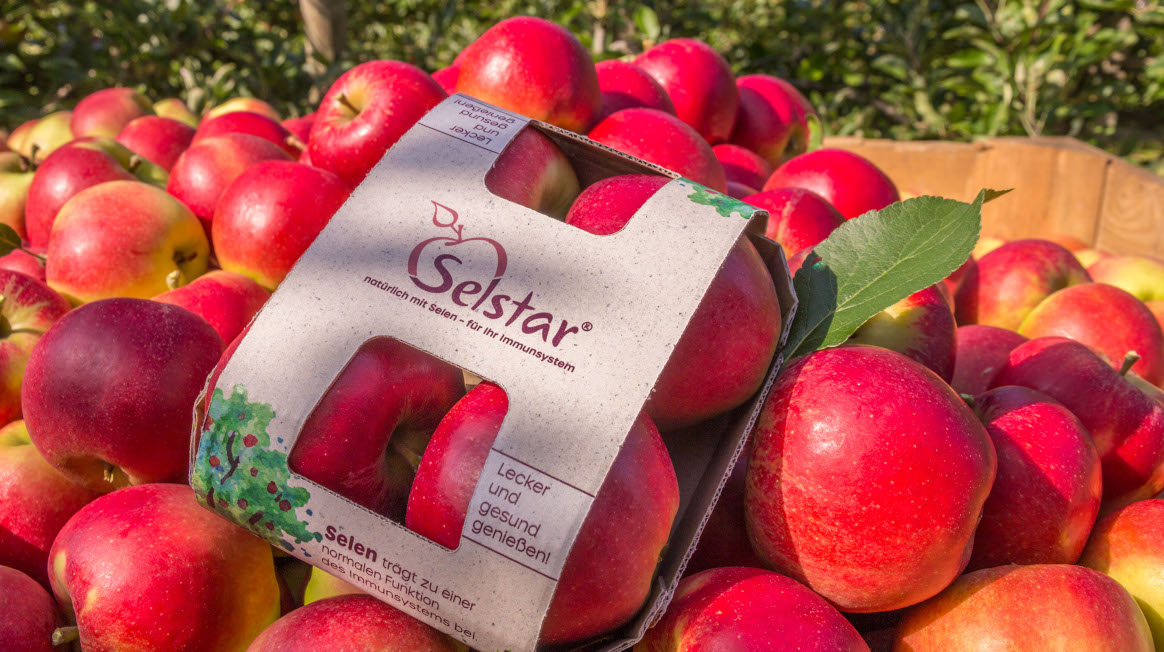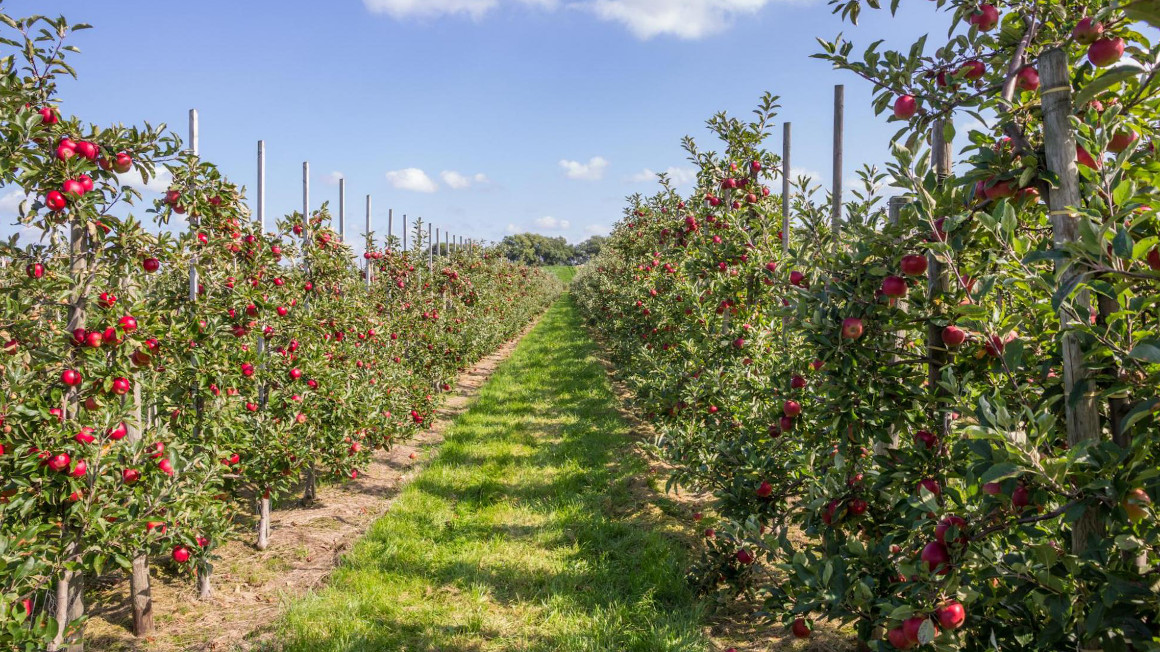
"An apple a day keeps the doctor away." Whether there is any truth in this old saying is debatable, but one thing is clear: apples are healthy because they are rich in vitamins, minerals and fiber. With a per capita consumption of 25 kilograms, apples are among the Germans' favorite fruits. Cultivation also shows its popularity: apples thrive on more than half of the fruit-growing areas in Germany. One of the most traditional fruit-growing areas, the Alte Land, has become a testing ground for researchers in recent years for an apple innovation called Selstar.
The Selstar was developed in the "BiofortiSe" project by researchers from Osnabrück University of Applied Sciences together with the University of Hamburg and AGLUKON Spezialdünger GmbH in Düsseldorf and funded by the German Federal Ministry of Education and Research over four years with around 450,000 euros as part of the "New Products for the Bioeconomy" ideas competition.
Natural alternative to food supplements
The name Selstar is a combination of the popular Elstar apple variety and selenium - a vital trace element that has been specifically added to the apple. "Studies have shown that selenium makes a crucial contribution to normal immune system function, but that the supply of selenium is often suboptimal," says project manager Diemo Daum. The problem: Plants do not necessarily need the trace element to grow. For this reason, it is not used in agriculture and is only present to a minor extent in the soil. Through the daily diet, the selenium requirement cannot always be adequately covered in regions with selenium-poor soils or in vegan diets. But too little selenium is a risk factor for many diseases. A deficiency can be particularly harmful to chronically ill and pregnant women.
"With the selenium-rich apple, we wanted to create a natural alternative to dietary supplements," explains Christoph Budke, who played a leading role in developing the apple novelty as part of his doctoral thesis. "And we wanted a fruit that appeals to many customers, works widely in cultivation in Germany, can be eaten fresh and is available all year round," adds Daum.
The idea was initially explored in 2016 during an exploratory phase lasting several months. Consumer surveys were conducted to determine the market potential for selenium-rich apples. This revealed that Elstar is the favorite among apples, but also that few consumers are even aware of the trace element selenium itself and its health value. "This is where we decided to develop a go-to-market strategy that highlights the positive health aspect of selenium," says Daum.

Increase of selenium content through foliar fertilization
The strategy was elaborated in the subsequent feasibility phase and verified in real market tests. However, the focus of the second stage, which lasted from 2017 to 2020, was the development of a process technology for the so-called biofortification of apples with selenium. Biofortification is the process of increasing the nutrient content of foodstuffs through plant breeding. In this case, the selenium was to be introduced into the apple via a special fertilizer. "It's not so easy to get the selenium into the fruit. We had to go through various variants in terms of the timing, the distribution of the selenium additions and the framework of the cultivation phase," explains Budke. Numerous field trials were therefore conducted to determine the best way for the fertilizer to be absorbed by the apples - via soil fertilization or foliar fertilization. "Here it quickly became clear that the foliar fertilization approach was significantly more efficient," says Budke.
Algae based fertilizer enriched with selenium
Different fertilizers enriched with selenium were also tested. After all, the fertilizer had to be attractive to the apple growers. In the end, there was a clear favorite: "An algae-based fertilizer proved to be particularly beneficial in combination with selenium," reports project manager Daum. The algae fertilizer from AGLUKON's portfolio was further developed into a selenium-containing algae fertilizer as part of the BiofortiSe extra project. At the same time, this selenium-containing algae fertilizer contains calcium, which improves fruit quality and shelf life. "The algae fertilizer with calcium and selenium has the advantage that the fruit grower does not need to carry out the selenium fertilization separately. This is then one operation." According to Daum, however, project partner AGLUKON first had to find the right formulation for this in long test series, as selenium cannot be easily combined with calcium.
The addition of selenium to the algae fertilizer also had a positive effect on secondary plant compounds in the apple. The researchers at the University of Hamburg, led by Sascha Rohn, found in their analyses that the content of polyphenols increased under certain conditions. These apples could provide better protection against harmful radicals through an increased antioxidant effect. A surprising further side finding was an effect on allergenic substances. "That's where we found that the level of the protein Mal d 1, which is responsible for apple allergy, is relatively reliably reduced by selenium fertilization," reports Daum. However, this does not mean that Selstar is allergen-free.
Selenium content increased tenfold
In the field trial, the apple trees were sprayed with the selenium-containing algae fertilizer. The selenium content was controlled via the fertilizer quantity and regularly monitored. As a result of the three-year feasibility phase, the research group was able to present an Elstar variety whose selenium content was increased more than tenfold. Each Selstar contains around 25 micrograms of selenium - about one-third of the recommended daily allowance. If the focus is on health, however, these apples should be eaten unpeeled, because the selenium content is highest in the fruit peel.
The selenium-rich apple innovation has now been on sale since 2019 and can be purchased in numerous EDEKA stores nationwide. Because sustainability was an important factor in evaluating the apple, the Selstar is sold in a plastic-free cardboard tray. The success eventually convinced many apple growers in the Alte Land: "We started with one grower in 2019. In 2020, we already had four growers and an acreage of five hectares. In 2021, there were then 19 growers and 33 hectares of cultivation area. Of the apples harvested there, around 550 tons were suitable for Selstar marketing," reports Budke proudly, who continues to support and advise apple growers on Selstar cultivation.
Education needed on health benefits of selenium
For the time being, the Selstar will only be grown in the Alte Land because the capacity to support new growing areas is still lacking. But the researchers hope that as awareness of the Selstar grows, demand for it will continue to rise and the apple project can be successfully continued as a start-up in the future. However, there is still a way to go until then, and education is the key to making Selstar popular. "We have made the experience that when customers have fully understood how healthy selenium is for the body, the acceptance of the product is very high. Otherwise, it stays on the shelf because of its slightly higher price," Daum said. Daum and Budke will therefore continue to educate people about the health benefits of the selenium-rich apple at events and press conferences so that "at some point, the name Selstar will stand for itself in such a way that customers will say, if an Elstar, then a Selstar."
Autorin: Beatrix Boldt


